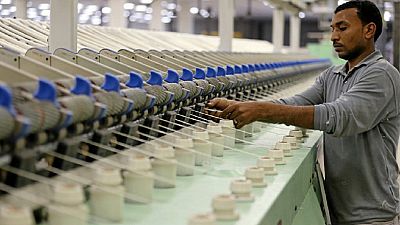Egypt
Currency flotation, the introduction of VAT and two huge hikes in customs tariffs have pushed inflation in Egypt to historic highs above 23 percent, making way for local production to flourish.
Chief Executive officer of a chocolate-maker in the country, Covertina, Mostafa Sayed Salam said business is booming adding that production rose 19 percent in 2016 from the previous year.
Since the pound fell in November after currency flotation, shoppers who traditionally preferred everything foreign have ditched imports goods to buying locally produce products.
“Egyptian products were able to prove themselves in the market, at the same quality of imported goods, and also importers of chocolate, say for example products from Turkey, after the flotation of the currency, it became hard for importers to sell the chocolate at the old prices, and therefore consumers were forced to turn to local products which enjoy the same quality of the imported,” he added.
The pound’s flotation and an ensuing increase in tariffs on more than 300 products shipped from abroad have hit importers hard. But the measures have been a boom for domestic manufacturers such as Covertina.
The country’s made products are much more affordable for customers who are increasingly prices conscious as inflation has shot above 28 percent.
After Egypt abandoned its peg of 8.8 pounds to the dollar on November 3, the currency has roughly halved in value to around 17.75.
According to the manager of hypermarket chain Samy Salama, Emad Maher switching to local products has increased by 90 percent, mainly because of the price difference.
“The decision (to float) led to an increase in all prices. All prices in Egypt have recently gone up by 80 percent. There isn’t one customer who walks in without complaining. Things that used to cost 1 pound now cost 5, and whatever used to cost 5 pounds, is now 10 pounds,” Maher said.
Multinationals are taking notice. Nestle, the packaged food giant, said in January it had signed a deal to acquire Caravan Marketing Company, an Egyptian instant coffee maker that had increased its domestic market share due to competitive pricing.
With Egypt long dependent on imports, the trend suggests the government’s efforts to narrow a big trade deficit and boost domestic industries are starting to work.
The chairman of Yasmine cosmetic company, Hesham Zahra noted that production had risen 25-35 percent since the flotation boosted sales both at home and abroad.
“There’s no doubt that, in all fields not just the cosmetics industry, Egyptians have always chosen imported products over the local. But because of the increase in prices of imported goods, Egyptians are now forced to turn to local products, which have become more affordable,” he said.
A government official said the deficit had narrowed by 17.4 percent compared with 2015.
As the unofficial figures suggest, the weaker pound is also helping Egyptian exporters.
Trade and Industry Minister Tarek Kabil told Reuters in October that Egypt had produced $4 billion worth of import substitutes since the start of 2016 and aimed to expand domestic industry by 8 percent in three years.













02:05
Zimbabwe: El Nino-linked drought threatens maize production
01:00
South Africa inflation eases in March
01:02
Pics of the day: April 16, 2024
01:13
Kenya power delivers cheaper electricity bills for residents
01:09
Nigeria sees record inflation in March
02:24
Zimbabweans forced to use US dollar in absence of new currency ZiG